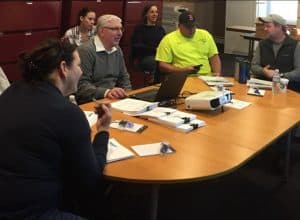Why Staff Needs to Know the Plan Ahead of Time
Benjamin Franklin once said, “by failing to prepare, you are preparing to fail.” While this remains true for all facets of life and community responsibility, the notion of emergency preparedness is critical, particularly within the water sector. Emergency preparedness strategies are designed to ensure that all processes can run smoothly during a crisis, and that clean, safe drinking water and sanitary services will continue to be provided to customers.
While many utilities may be more prepared now than at the start of the pandemic, additional work may be needed to document plans and procedures. By preparing written plans, a utility can be stronger and more prepared for any emergency or crisis.

The most common (and required) method of emergency preparedness for water suppliers and utilities are Emergency Response Plans (ERP). ERPs are mandatory for all public water suppliers, and public water systems in Massachusetts are required to provide a minimum of 10 hours of Emergency Response training annually for all employees. Trainings help water system managers and staff explore vulnerabilities, make improvements, and establish procedures to follow during an emergency. Preparing and implementing a response plan can save lives, prevent illness, enhance system security, minimize property damage, and lessen liability.
There are many components to an ERP, each playing a key role in mitigating issues.
- EPA Certification Form
- Introduction
- Response Plans
- Emergency Planning
- Mitigation
- Emergency Response Plan Policies
- Water System Policies
- Telephone Contact Numbers
- Critical Customers
- System Information
- Emergency Action Plans
- Incident Specific Emergency Action Plans
- Safety Data Sheets (SDS)
- Interconnection Agreements
- Standard Operating Procedures
- Comprehensive Flushing Program
Outside of ERPs, many utilities are finding it helpful to implement additional emergency preparedness initiatives into their ERPs. Whether the crisis is a pandemic, a flood, or a natural disaster, keeping staff educated, informed, and in the loop will prevent additional issues from arising during an emergency.

By asking the right questions and preparing in advance, your utility can clarify the roles and responsibilities of personnel and identify any additional mitigation measures and preparedness needs.
Some important questions to raise in implementing additional emergency preparedness measures include:
- Does the utility have all of the proper written protocols in place?
- Has the utility defined all critical positions?
- Have back-ups been identified for each critical position?
- How do we keep staff safe?
- Are there opportunities for improvement?
- Are there gaps in knowledge of personnel, health and safety measures, or security that should be improved upon?
By answering these and other questions, a plan can be developed and easily followed by all staff members. A solid and well thought out plan leaves little room for interpretation and clearly defines roles and responsibilities, as well as the hierarchy of authority.
Once the emergency preparedness measures are in place, be sure that all staff and personnel are informed and properly trained. This will eliminate panic and provide additional assurance should a crisis arise in the future. Additionally, if staff are prepared and aware of their roles and responsibilities, there will be a smaller gap in service for customers.
Benefits to staff in being prepared for emergencies include:
- Decreased feeling of vulnerability
- Reduction of fear and anxiety
- Confidence in roles and responsibilities
- Increased awareness of utility’s commitment to the safety of the team
- Knowing what to expect
Interested in implementing additional emergency preparedness training within your utility? Tata & Howard offers several training options and formats including:
- ERP Training
- Tabletop Exercises
For more information, please contact Karen Gracey at kgracey@tataandhoward.com or 508. 219.4021.
